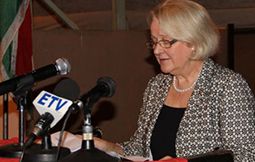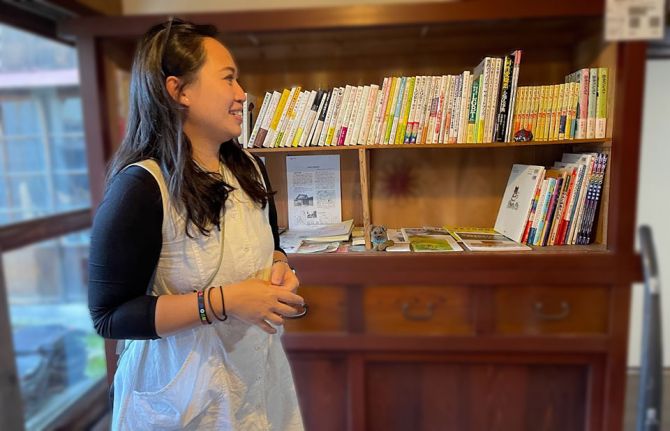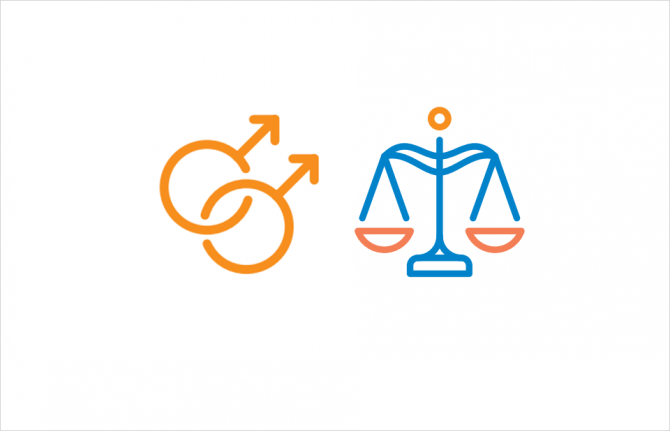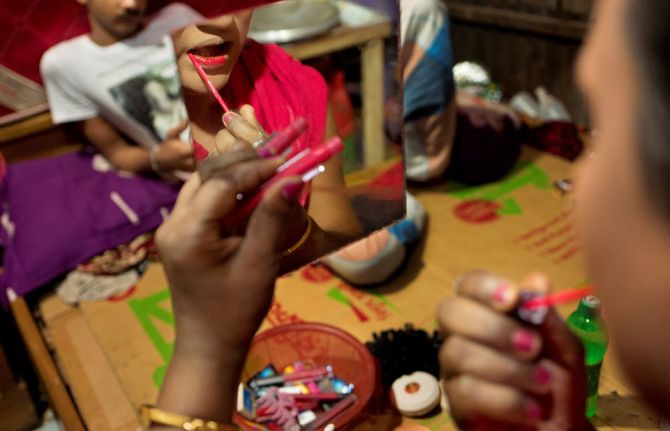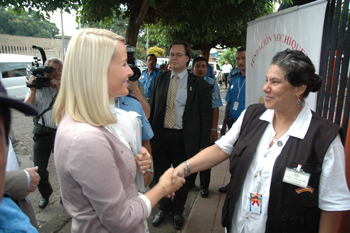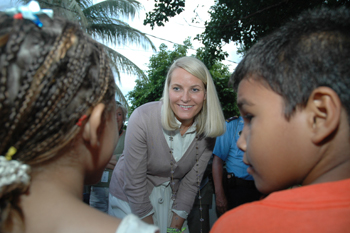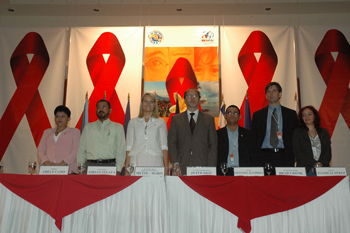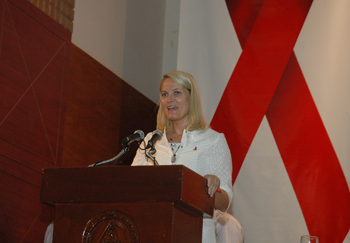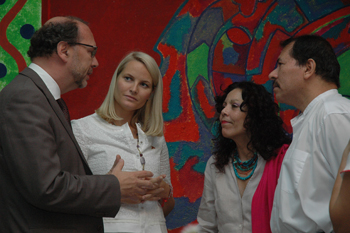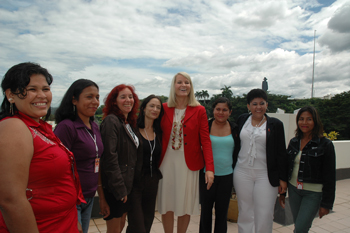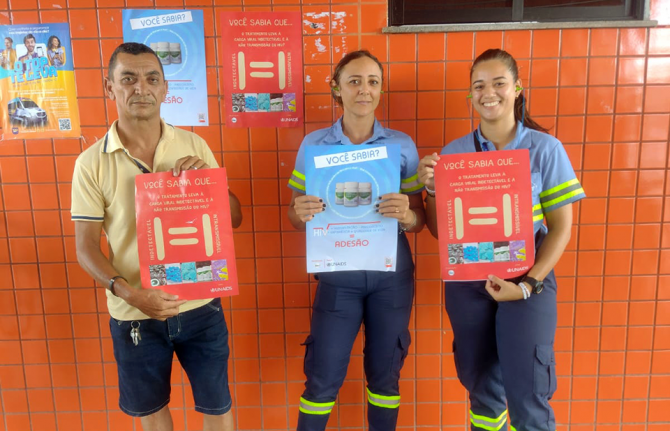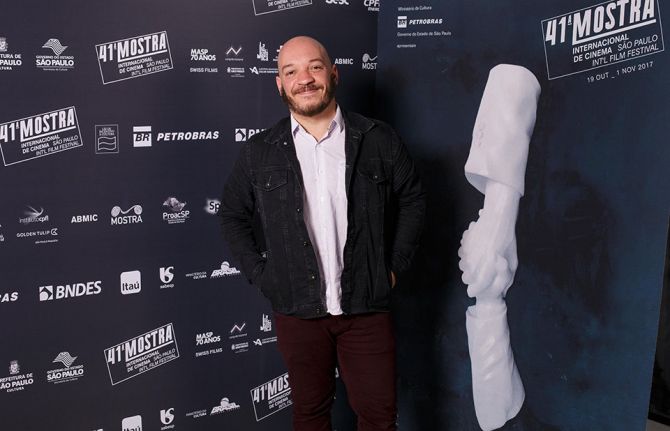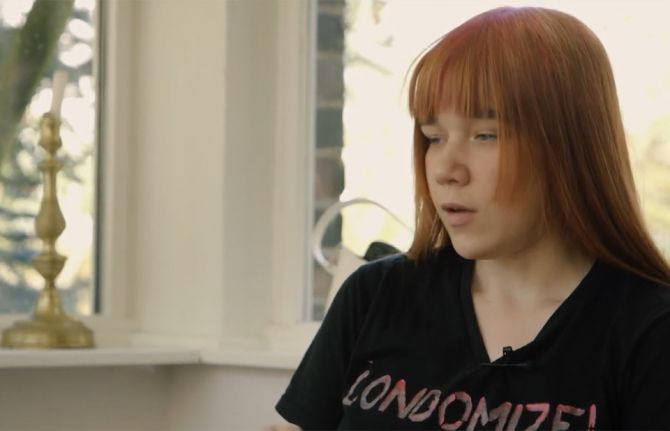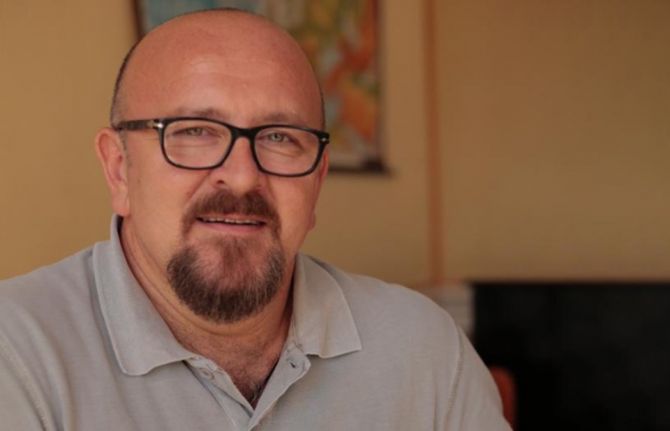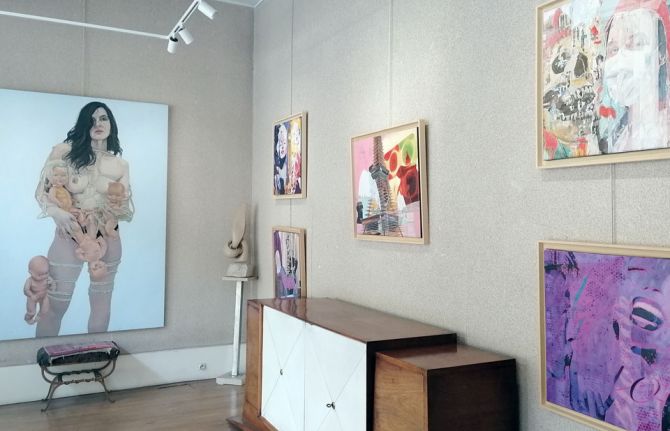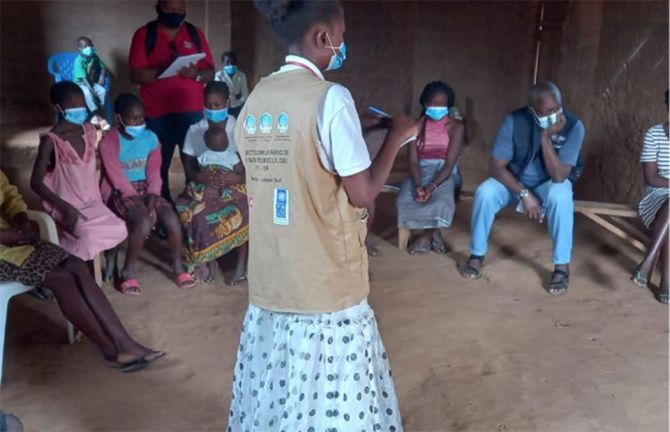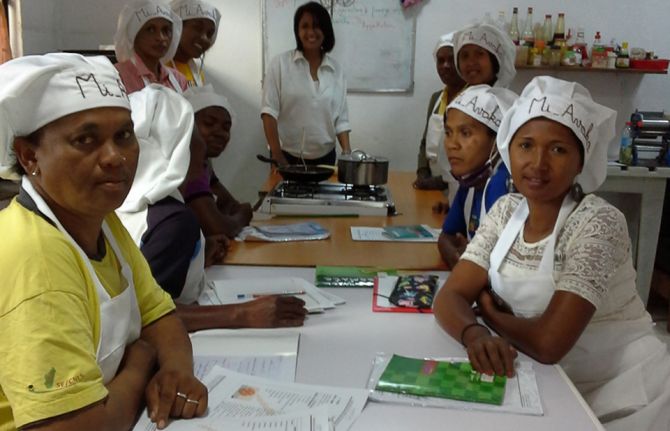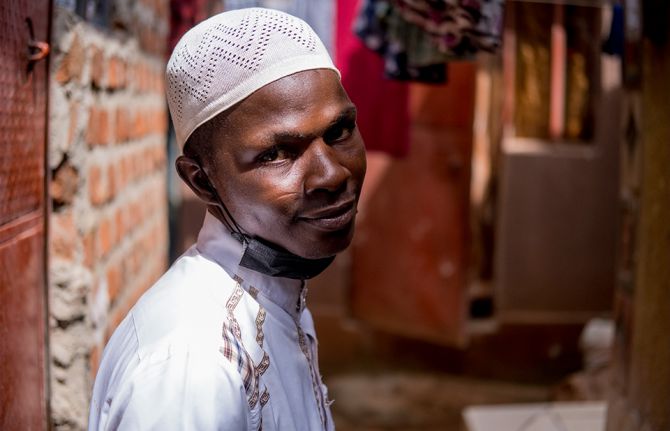Documents
Launch of the Global Coalition on Women and AIDS,
February 2004
Related
The many faces of a Cambodian entertainment worker
12 novembre 2014
20th international AIDS conference
25 juillet 2014
Monks provide hope to people living with HIV
10 juin 2013
Unique art exhibition explores vulnerability to HIV
20 décembre 2011
World AIDS Day 2011 around the Globe
01 décembre 2011
2011 UN High Level Meeting in New York
28 juin 2011
Life Ball 2011
24 mai 2011
Documents
World AIDS Day 2011 around the Globe
World AIDS Day 2011 was held on 1 December under the theme of “Getting to Zero”. Here are some photos from across the globe capturing the sprit of this year’s commemorations.
Related
20th international AIDS conference
25 juillet 2014
Unique art exhibition explores vulnerability to HIV
20 décembre 2011
 UNAIDS joins hands with Standard Bank to “Get to Zero”
UNAIDS joins hands with Standard Bank to “Get to Zero”

16 décembre 2011
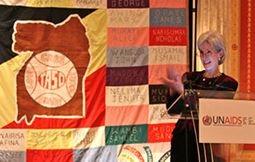 U.S. Secretary of Health and Human Services, Kathleen Sebelius, speaks at UNAIDS' Washington, DC Commemoration
U.S. Secretary of Health and Human Services, Kathleen Sebelius, speaks at UNAIDS' Washington, DC Commemoration

04 décembre 2011
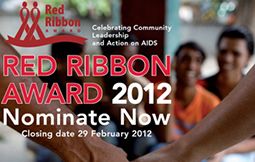 The 2012 round for the Red Ribbon award is open for nominations
The 2012 round for the Red Ribbon award is open for nominations

01 décembre 2011
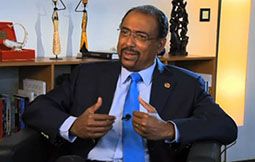 2011 World AIDS Day Statements
2011 World AIDS Day Statements

01 décembre 2011
World AIDS Day 2011 around the Globe
01 décembre 2011
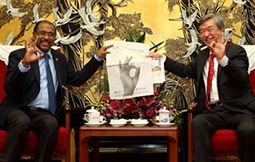 UNAIDS and Xinhua global media campaign kicks off
UNAIDS and Xinhua global media campaign kicks off

30 novembre 2011
UN Secretary-General's Message on World AIDS Day 2011
28 novembre 2011
Documents
Au Myanmar, des moines apportent leur aide aux personnes vivant avec le VIH
Malgré les progrès de la riposte au sida au Myanmar, le traitement anti-VIH reste disponible en majorité uniquement dans les grandes villes. À Rangoun, la plus grande ville du pays, des moines ont ouvert les portes de leur monastère aux personnes vivant avec le VIH qui arrivent dans la ville pour recevoir un traitement contre le VIH.
Related
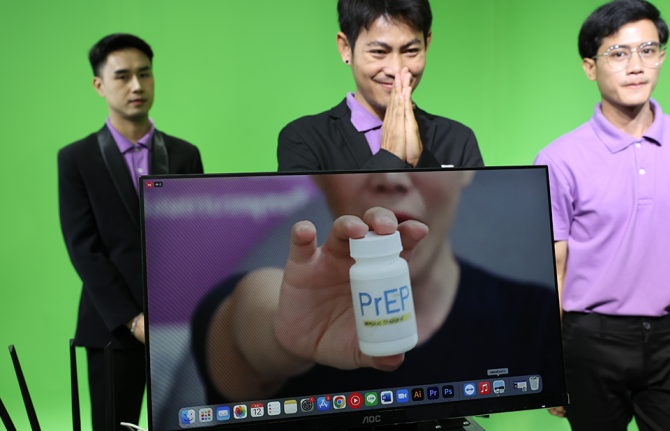 Thailand’s Mplus: HIV services delivered in style
Thailand’s Mplus: HIV services delivered in style

13 décembre 2022
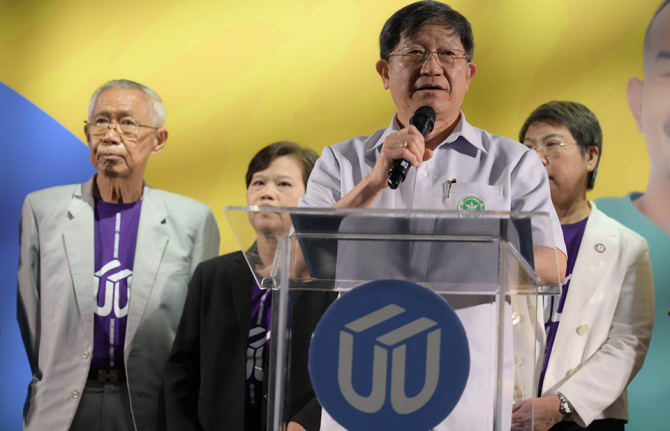 Preventing transmission and tackling stigma: The power of U=U
Preventing transmission and tackling stigma: The power of U=U

12 décembre 2022
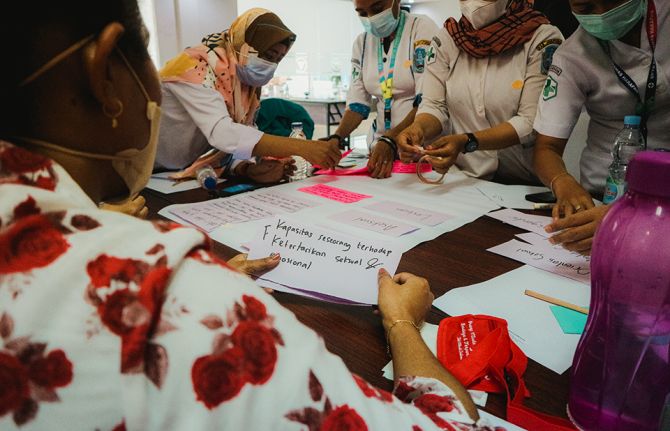 Training health-care workers in Indonesia to improve HIV services for young key populations
Training health-care workers in Indonesia to improve HIV services for young key populations

30 mars 2022
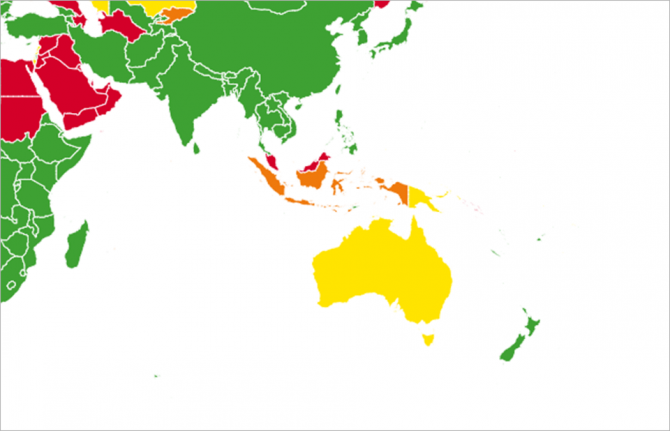 UNAIDS welcomes New Zealand’s decision to lift travel restrictions for people living with HIV
UNAIDS welcomes New Zealand’s decision to lift travel restrictions for people living with HIV

25 octobre 2021
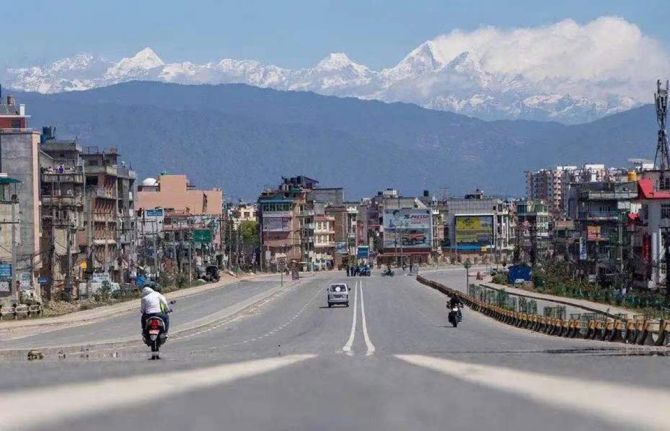 Stranded in Nepal without HIV medicine
Stranded in Nepal without HIV medicine

15 mars 2021

Feature Story
HRH and UNAIDS Special Representative, the Crown Princess of Norway at CONCASIDA
08 novembre 2007
08 novembre 2007 08 novembre 2007As part of an official visit to Nicaragua to learn more about the impact AIDS is having on women, UNAIDS Special Representative, HRH the Crown Princess of Norway visited a grassroots AIDS organisation working on issues of human rights and the sexual and reproductive rights of women and children.
The visit was part of a four-day advocacy mission to the region for the Crown Princess during which she will be engaging with different groups and individuals involved in the AIDS response and participating in events organised at the 5th Central American Congress on AIDS (CONCASIDA).
|
|
HRH and UNAIDS Special Representative, the Crown Princess Mette-Marit of Norway during her arrival to the Xochiquetzal Foundation with the Director of the organization, Mrs. Hazel Fonseca. |
|
|
HRH and UNAIDS Special Representative, the Crown Princess Mette-Marit of Norway sharing with children of the San Jose Oriental Neighborhood during her field visit to the Xochiquetzal Foundation. |
|
|
UNAIDS Executive Director, Dr. Peter Piot and HRH and UNAIDS Special Representative, the Crown Princess Mette-Marit amongst other Officials who participate in opening event of the V Central American Meeting of people living with HIV that took place in Managua as part of the 5th Central American Congress on HIV (CONCASIDA). |
|
|
HRH and UNAIDS Special Representative, the Crown Princess Mette-Marit of Norway, during her speech at the official closing session of the V Meeting of People living with HIV in Managua, Nicaragua. 4 – 9 November 2007. |
|
|
From L to R: UNAIDS Executive Director, Dr. Peter Piot, HRH and UNAIDS Special Representative, the Crown Princess Mette-Marit of Norway, Mrs. Rosario Murillo, Nicaraguan First Lady and Nicaraguan President, Daniel Ortega, during a private meeting in Managua, Nicaragua, in which they share suggestions on the improvement of the HIV response in the Central American region. Nicaragua 4 – 9 November 2007. |
|
|
HRH and UNAIDS Special Representative, the Crown Princess Mette-Marit of Norway during her encounter with ASONVIHSIDA (Nicaragua organization of people living with HIV) leaders. |

Feature Story
4th IAS Conference on HIV Pathogenesis, Treatment and Prevention in Sydney
25 juillet 2007
25 juillet 2007 25 juillet 2007The Australian Society for HIV Medicine and the International AIDS Society were the hosts of the 4th IAS Conference on HIV Pathogenesis, Treatment and Prevention.More than 5,000 delegates from 133 countries came together for the four-day conference to examine the latest developments in HIV biology, pathogenesis, treatment and prevention science.Emphasising the need to scale-up TB/HIV programmes Michel Sidibe, UNAIDS Deputy Executive Director of Programmes, UNAIDS said, "Urgent investment in TB research and programmes is needed if we are to avoid TB, and especially drug resistant TB, undoing all the advances we have gained through better AIDS treatment and care. All of our drugs, diagnostics and vaccines date from the last century or even the century before that."
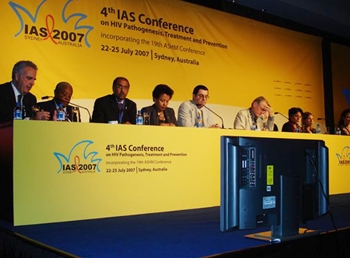 |
Presentations included the roll out of antiretroviral treatment in the developing world and the need for research to inform treatment scale-up, HIV/TB co-infection, and ethical and practical issues related to HIV prevention research. 22-25 July 2007, Sydney, Australia. |
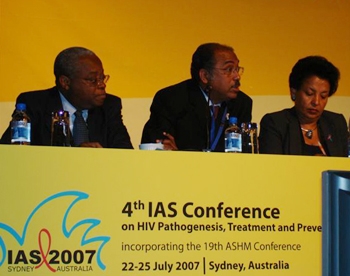 |
Deputy Executive Director of Programmes at UNAIDS, Michel Sibide, participated in events around treatment, sustainability in the era of universal access, the TB/HIV co-epidemic and men who have sex with men in Asia. 22-25 July 2007, Sydney, Australia. |
 |
UNAIDS supported an emotive exhibition at the Sydney AIDS conference portraying, in words and pictures the double impact that TB and HIV has on people and communities in South Africa and Zambia. |
Links:
Read Sydney AIDS Conference reports on scientific advances in HIV treatment and prevention
4th IAS Conference on HIV Pathogenesis, Treatment and Prevention opens in Sydney
4th IAS Conference on HIV Pathogenesis, Treatment and Prevention, Sydney 2007
Related
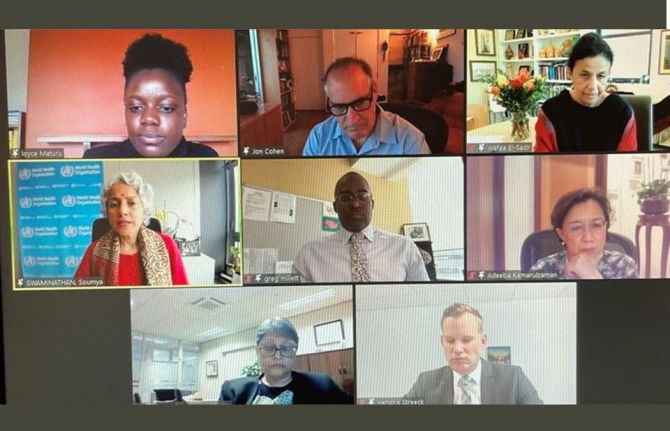 Science, HIV and COVID-19—where are we headed?
Science, HIV and COVID-19—where are we headed?

08 juin 2021
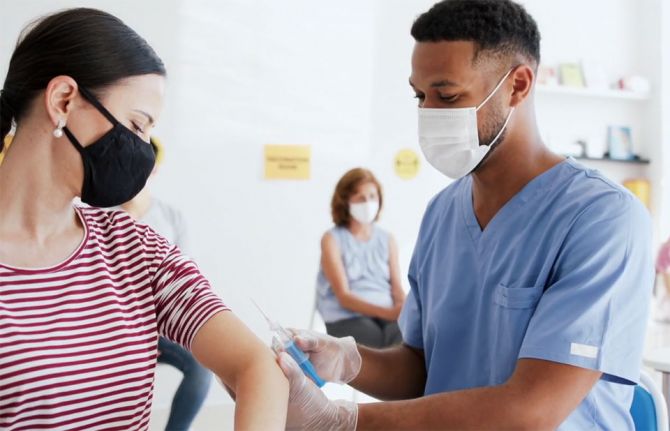 How was a COVID-19 vaccine found so quickly?
How was a COVID-19 vaccine found so quickly?

09 février 2021
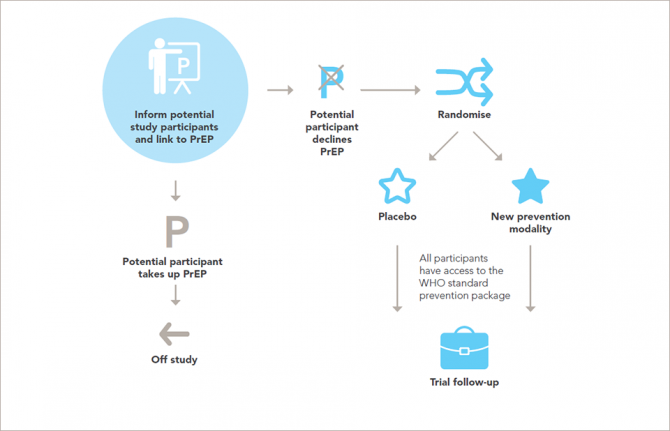 New guidance on ethical HIV prevention trials published
New guidance on ethical HIV prevention trials published

27 janvier 2021

Feature Story
Implementers' meeting
27 juin 2007
27 juin 2007 27 juin 2007Representatives from over 50 countries came together in Kigali on 16 June for the opening session of the HIV/AIDS Implementer’s Meeting hosted by the government of Rwanda and cosponsored by PEPFAR, the Global Fund to Fight AIDS, Tuberculosis and Malaria; the UNAIDS Secretariat, UNICEF, WHO and the World Bank .
The theme of this year’s meeting, “Scaling Up Through Partnerships,” recognizes the rapid expansion of HIV/AIDS programs worldwide. Together, implementers will exchange lessons learned on building the capacity of local prevention, treatment, and care programs, maintaining quality control, and coordinating efforts. This forum will facilitate an open dialogue about future directions of HIV/AIDS programs, with a strong emphasis on implementation and identification of critical barriers and best practices.
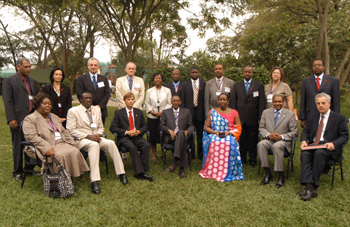 |
Donors, AIDS experts and implementers from around the world gathered in Kigali, Rwanda to attend the 2007 HIV/AIDS Implementers’ Meeting. The meeting was hosted by the government of Rwanda and cosponsored by PEPFAR, the Global Fund to Fight AIDS, Tuberculosis and Malaria; the UNAIDS Secretariat, UNICEF, WHO and the World Bank. |
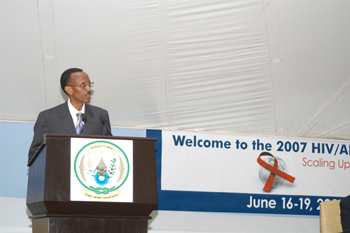 |
In his opening key note address, His Excellency the President of the Republic of Rwanda, listed the achievements to date and elaborated on the drivers of progress. He also insisted on making a breakthrough in strengthening health systems by joining forces with development partners to build capacity. |
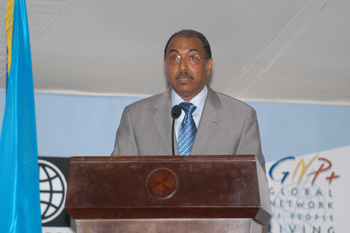 |
Michel Sidibe, UNAIDS Deputy Executive Director delivered a speech on behalf of Dr. Peter Piot, UNAIDS Executive Director, highlighting 5 key strategic areas: Spending money on programmes and priorities owned by communities who understand their epidemics; Enhancing capacity in education and social services and making use of communities and civil society as invaluable resources; Shifting from short term interventions to more strategic long term approaches; Putting AIDS at the core of any development programme; and scaling-up for greater efficiency in delivering results without loosing money on the way. |
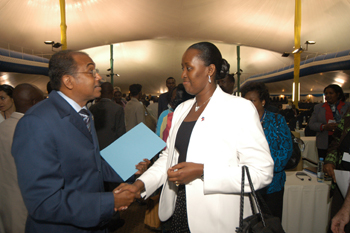 |
Michel Sidibe, UNAIDS Deputy Executive Director talks to the First Lady of Rwanda Jeannette Kagame during the 2007 HIV/AIDS implementers meeting. |
 |
UNAIDS Special Representative Mary Fisher during her speech at the 2007 HIV/AIDS implementers' meeting. |
Related
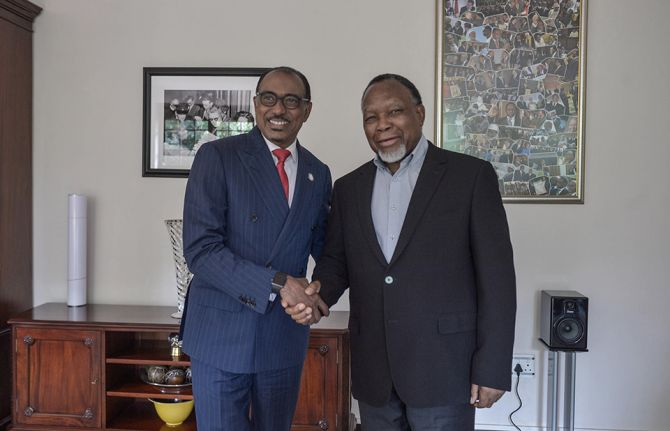 Keeping up the momentum in the global AIDS response
Keeping up the momentum in the global AIDS response

24 avril 2019
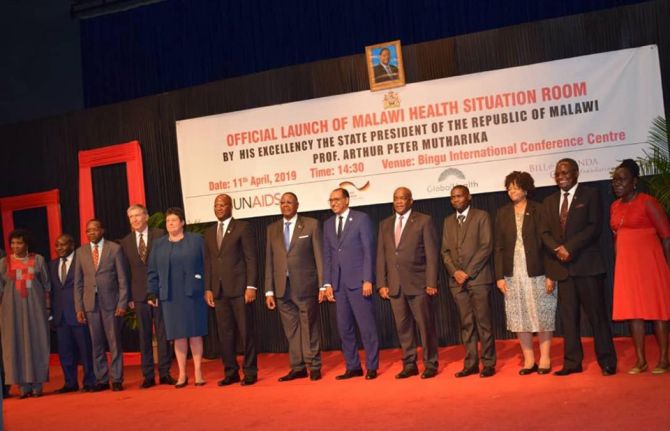 Malawi launches its health situation room
Malawi launches its health situation room

12 avril 2019
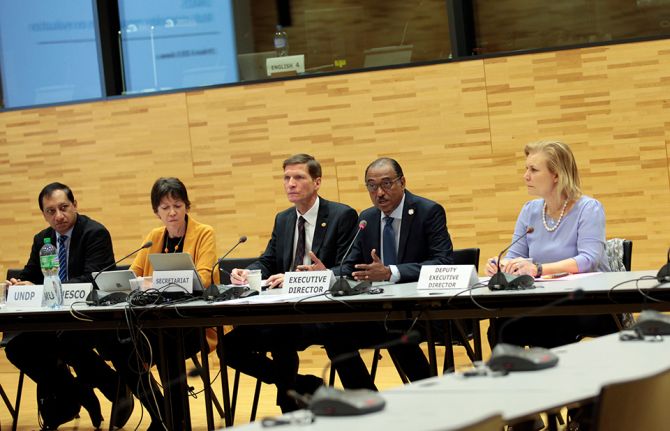 Learning lessons on evaluation
Learning lessons on evaluation

02 avril 2019

Feature Story
UN Plus rencontre le Secrétaire général des Nations Unies: photos
22 mai 2007
22 mai 2007 22 mai 2007Dans le cadre de la 61ème session de l’Assemblée générale, UNPlus – groupe composé des membres du personnel du système des Nations Unies vivant avec le VIH – a rencontré le Secrétaire général de l’ONU, M. Ban Ki-moon, pour l’informer de ses principales réalisations depuis sa création en mars 2005 et pour examiner les perspectives et difficultés qu’ont les membres séropositifs du personnel de l’ONU dans leur activité professionnelle.
Pendant la réunion, une délégation des membres du groupe UNPlus a présenté au Secrétaire général des documents d’orientation spécialisés couvrant quatre grandes questions les intéressant : la stigmatisation et la discrimination, la confidentialité, la couverture médicale, et les restrictions de voyage et la mobilité. En outre, le groupe a émis des demandes précises concernant les mesures préconisées dans les documents. La réunion a également servi à évaluer les progrès enregistrés sur les questions concernées et à examiner comment aller de l’avant pour améliorer l’ambiance de travail pour toutes les personnes vivant avec le VIH employées au sein du système des Nations Unies.
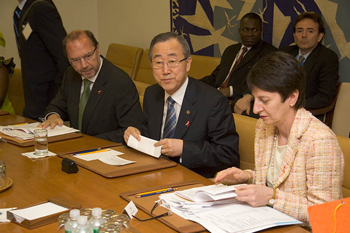
De gauche à droite: Le Directeur exécutif de l'ONUSIDA, Dr.Peter Piot, le Secrétaire général de l'ONU Ban Ki-Moon et la directrice exécutive adjointe Deborah Landey pendant la réunion avec le groupe UNplus.
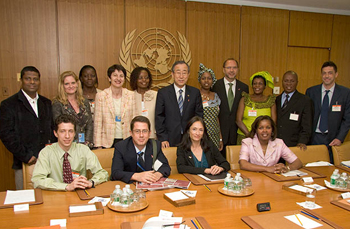
Les membres d'UNplus avec le Secrétaire général de l'ONU Ban Ki-Moon après l'avoir informé des principaux accomplissements du groupe.

Le Secrétaire général de l'ONU Ban Ki-Moon avec la Coordonatrice mondiale d'UNplus Bhatupe Mhango après la réunion où celle-ci a exposé un rapide historique d'UNplus.
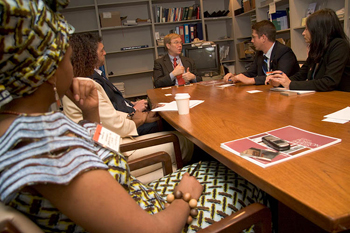
Les membres du Comité consultatif d'UNplus rencontre le Directeur du Service médical de l'ONU. L'un des principaux problèmes soulevés par le groupe UNplus est l'apport d'une assurance maladie complète et non discriminatoire pour tout le personnel.
Photos: ONUSIDA/Brad Hamilton
Liens:
Lire l'histoire complète
Visiter le site web d'UNplus
Related
 Promoting gender equality in Brazil step by step
Promoting gender equality in Brazil step by step

30 octobre 2019
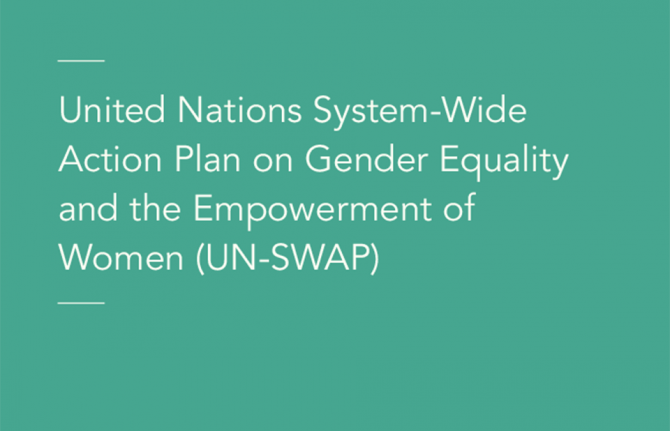 UNAIDS still ahead in implementing UN-SWAP
UNAIDS still ahead in implementing UN-SWAP

10 septembre 2019

Feature Story
Conférence européenne sur le sida 2007
11 mars 2007
11 mars 2007 11 mars 2007Les représentants de 27 pays de l’Union européenne et de pays avoisinants se sont rencontrés à Brême, en Allemagne, pour discuter des moyens de renforcer le leadership politique dans la riposte au sida. Plus de 600 personnes étaient présentes à la conférence, qui était organisée par le Gouvernement fédéral allemand dans le cadre de sa Présidence de l’Union européenne en 2007. Le jour de l’ouverture, le Dr Peter Piot, Directeur exécutif de l’ONUSIDA, a parlé de l’épidémie dans la région et des actions nécessaires pour la freiner. Le second jour de la conférence, des ateliers ont eu lieu sur de nombreux aspects essentiels de la riposte au sida dans la région, y compris des exposés sur les droits humains, les migrations, la discrimination, la sexospécificité et sur les problèmes relatifs au commerce du sexe, à la consommation de drogues injectables et aux hommes qui ont des rapports sexuels avec des hommes.
 |
Le Dr Peter Piot, Directeur exécutif de l’ONUSIDA, s’entretient avec Mme Angela Merkel, Chancelière de la République fédérale d’Allemagne, à la Conférence européenne sur le sida 2007 à Brême, Allemagne, les 12-13 mars 2007. |
 |
Mme Angela Merkel, Chancelière de la République Fédérale d’Allemagne, lors de son discours à la Conférence européenne sur le sida 2007 à Brême, Allemagne, les 12-13 mars 2007. |
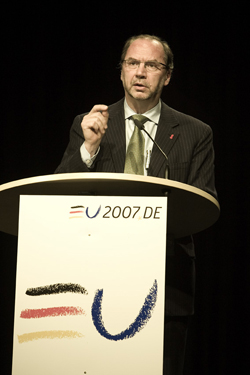 |
Le Dr Peter Piot, Directeur exécutif de l’ONUSIDA, lors de son discours à la Conférence européenne sur le sida 2007 à Brême, Allemagne, les 12-13 mars 2007. |
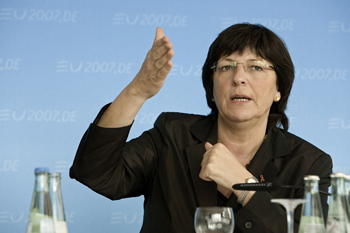 |
Mme Ulla Schmidt, Ministre allemande de la santé, lors de la conférence de presse de clôture de la Conférence européenne sur le sida 2007 à Brême, Allemagne, les 12-13 mars 2007. |
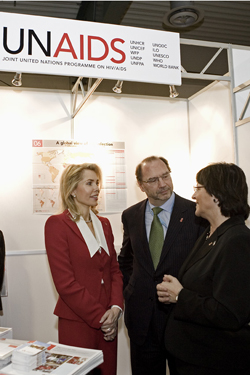 |
Le Dr Peter Piot, Directeur exécutif de l’ONUSIDA, visitant le stand de l’ONUSIDA avec Son Altesse la Bégum Aga Khan et Mme Ulla Schmitt, Ministre allemande de la santé, lors de la Conférence européenne sur le sida 2007 à Brême, Allemagne, les 12-13 mars 2007. |
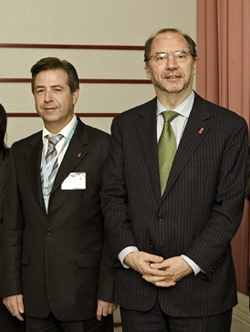 |
Le Dr Peter Piot, Directeur exécutif de l’ONUSIDA, rencontre M. Yuriy Poliachenko, le Ministre ukrainien de la santé, lors de la Conférence européenne sur le sida 2007 à Brême, Allemagne, les 12-13 mars 2007. |
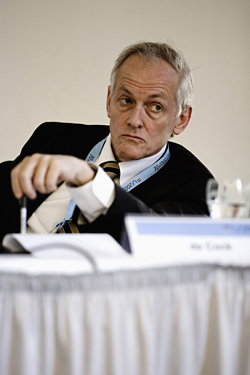 |
M. Kevin De Cock, Directeur du département VIH/sida de l’Organisation mondiale de la Santé, au cours d’un atelier sur le rôle de l’Union européenne et des pays européens dans la riposte mondiale au sida, lors de la Conférence européenne sur le sida 2007 à Brême, Allemagne, les 12-13 mars 2007. |
 |
Mme Sophia Kistling, Directrice du programme de l’Organisation internationale du Travail sur le sida, au cours d’un atelier sur le rôle de l’Union européenne et des pays européens dans la riposte mondiale au sida, lors de la Conférence européenne sur le sida 2007 à Brême, Allemagne, les 12-13 mars 2007. |
 |
Mme Nina Ferencic, Conseillère régionale de l’UNICEF sur le sida en Europe centrale et orientale, au cours d’un atelier sur la coopération transfrontalière en Europe, lors de la Conférence européenne sur le sida 2007 à Brême, Allemagne, les 12-13 mars 2007. |
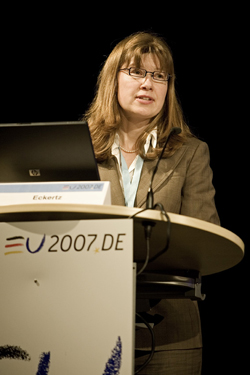 |
Mme Dorothee Eckertz, Chef des opérations de la Banque Mondiale, s’exprimant sur l’expérience acquise en matière de réduction des risques dans la région européenne élargie, lors d’un atelier sur les droits humains à la Conférence européenne 2007 sur le sida. |
Photos: N.Wolff
Liens:
Lire aussi
Lire le discours du Directeur exécutif de l’ONUSIDA (pdf, 43,0 Kb) (en anglais)
Lire le discours de la Chancelière d’Allemagne fédérale (en allemand)

Feature Story
Joint UNAIDS / DFID delegation visit to India
19 décembre 2006
19 décembre 2006 19 décembre 2006AIDS leaders from the United Kingdom and the Joint United Nations Programme on HIV/AIDS (UNAIDS) came together in India for a joint mission to gain greater insight into the country’s AIDS response. During the four-day visit, Sir Suma Chakrabarti, Permanent Secretary at the Department for International Development (DFID) and Dr Peter Piot, Xecutive Director of UNAIDS met with political leaders, senior government officials and parliamentarians, students, representatives from non governmental organizations and from the donor community.
As part of the mission, the delegation visited Patna in the North Indian state of Bihar on Saturday 16 December where Dr Piot and Sir Chakrabarti noted the significant progress made in this province since their last visit, including the establishment of India’s first ‘Legislative Forum on HIV and AIDS’ to raise AIDS awareness among policy makers in the state and to build capacity to address the challenges posed by AIDS.
|
|
Dr. Peter Piot, Executive Director, |
|
Mr. Nitish Kumar, Chief Minister of Bihar |
|
Dr.Peter Piot. Executive Director, UNAIDS addressing the gathering of Elected People’s Representatives in the State Capital of Patna on 16th December 2006 |
|
Sir Suma Chakrabarthi, Parmanent Secretary of the Department for International Development (DFID) addressing the gathering |
|
Heads of the Joint Mission Dr. Peter Piot, Executive Director, UNAIDS and Sir Suma Chakrabarti, Parmanent Secretary of the Department for International Development (DFID) greeting His Excellency R.S.Gavai, the Governor of Bihar State and the Chancellor of Patna University with the Speaker of Bihar Legislative Assembly, Mr. Uday Narain Chowdhury during the interactive session with students at the Wheeler Senate Hall, Patna University, Patna on 16th December 2006. |
|
A cross section of the gathering at |
In New Delhi, the joint delegation met with political leaders and senior officials including the Indian Minister of Health and Family Welfare, Dr. Anbumani Ramadoss, the Indian Minister of Finance, P. Chidambaram and Sitaram Yechury, Polit Bureau Member of the Communist Party of India.
|
Dr. Peter Piot, Executive Director UNAIDS and Sir Suma Chakrabarti, Parmanent Secretary of the Department for International Development (DFID) during their meeting with Dr. Anbumani Ramadoss, Indian Minister of Health & Family Welfare in New Delhi, India on Monday 18 December 2006 |
|
Dr. Anbumani Ramadoss, Indian Minister of Health & Family Welfare with Dr. Peter |
|
Dr. Peter Piot, Executive Director UNAIDS and Sir Suma Chakrabarti Parmanent Secretary of the Department for International Development (DFID) meet with Sitaram Yechury, Polit Bureau Member of the Comunist Party of India |
|
From left to right Indian Minister of |
|
Dr. Peter Piot, Executive Director UNAIDS and Sir Suma Chakrabarti, Parmanent Secretary of the Department for International Development (DFID)exchange notes after meeting with Indian Finance Minister P. Chidambaram outside his office at North Block in New Delhi, India on Monday 18 December 2006. |
Photo credit for New Delhi : S. Sharma
Related
 Thailand’s Mplus: HIV services delivered in style
Thailand’s Mplus: HIV services delivered in style

13 décembre 2022
 Preventing transmission and tackling stigma: The power of U=U
Preventing transmission and tackling stigma: The power of U=U

12 décembre 2022

Feature Story
19th Programme Coordinating Board meeting, Lusaka, Zambia, 6-8 December 2006
08 décembre 2006
08 décembre 2006 08 décembre 2006Some 260 participants gathered in Lusaka for the 19th Joint United Nations Programme on HIV/AIDS governing board meeting. The meeting brought together representatives from government, civil society, donors and the United Nations to push for greater UN action to strengthen country efforts against AIDS.
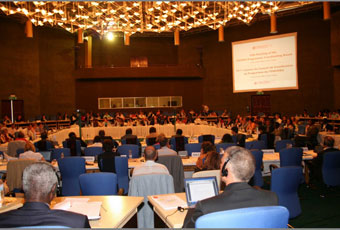 |
General view of the participants attending the 19th PCB meeting hold in Lusaka, Zambia, 6-8 December 2006 |
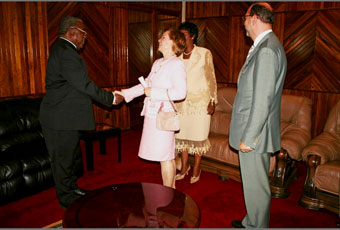 |
|
 |
One of the 19th PCB sessions was chaired by: (from left to right) Dr. Peter Piot, Executive Director, UNAIDS, Mrs. Gunilla Carlsson, Minister of International and Cooperative Development of Sweden, Mr. Ruphia Banda, Vice-President of Zambia, Mrs. Silvia T. Masebo, Acting Minister of Health, Zambia. |
 |
Namwene Phiri addressing the participants to the "Keep the Promise" session after receiving a prize for her contribution to the New York and Toronto banners. |
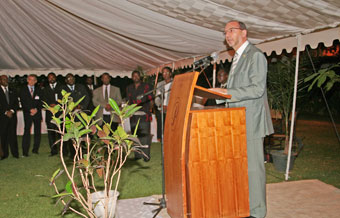 |
Dr. Peter Piot, Executive Director, UNAIDS addressing the participants to the reception hosted by the Minister of Health of Zambia and the Swedish Minister of the International and Cooperative Development at the 19th PCB meeting hold in Lusaka, Zambia, 6-8 December 2006 |
UNAIDS Executive Director Dr Peter Piot met with the Delegation from the Democratic Republic of the Congo during the PCB. The DRC has just completed its first democratic elections with the election of President Joseph Kabila. The DRC has been wracked by civil war for a number of years and the elections herald the start of a new era for the DRC. Dr Piot said in the opening plenary that the new era provides an opportunity to step up the pace of the AIDS response in the DRC.
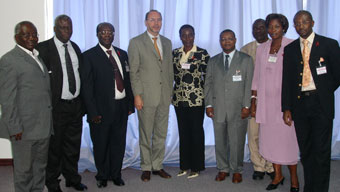 |
From left to right: Dr Engwanda, Head of NGO’s Forum for HIV/AIDS, DRC, |
All photo credit: S. Katilungu

